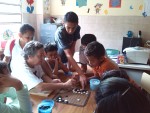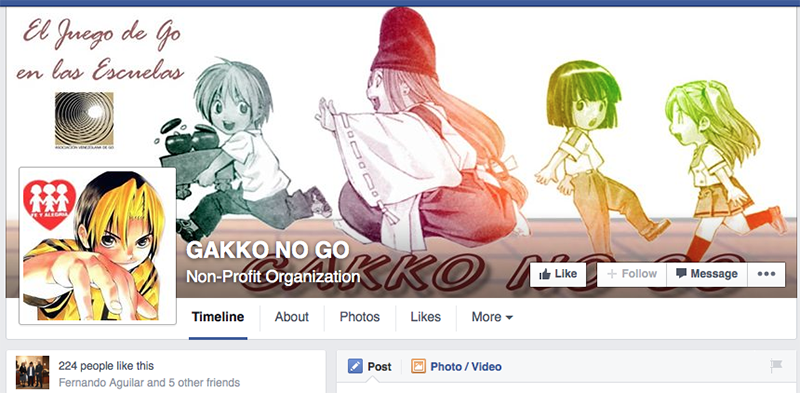Proyecto Gakko no Go
| Name: | Proyecto Gakko no Go |  |
| Contributor: | Maria (Loli) Puerta | |
| Organisation: | ||
| Edition: | 2015 | |
| Prize: | Encouragement Prize (3rd place) |
Project Description
The Gakko no Go project started in 2008 with the aim to teach go in school and has been developed in at least five schools spread all over Venezuela, affiliated to an educational and public catholic organization called "Fe y Alegria" (Faith and Happiness, founded to teach low income family children and teenagers). The Gakko no Go project was born when, in 2008, a young and enthusiastic catholic Sister and teacher named Marisela Mujica was enchanted by the Hikaru no Go comic. She proposed Loli Puerta to start a Go game workshop to schoolchildren on Saturdays.
The name of the school is "Jesus Maestro". It is located in Caracas, in the middle of one of the bigger marginalized favelas in South America. Some players of the Venezuelan Go Association, mostly volunteers, give go lessons during the schoolyear and organise a Final Tournament (both individual and by teams) at the end of the period. Tournaments help the children a lot and stimulate discipline and the desire to improve. In adittion, we observed that the children very much appreciate having a "judge" in their lives. As the project progressed, it became necessary to help the voluntary teachers, because there wasn't any guide or teaching method in the Spanish language. During the 2012-2013 schoolyear, thanks to the International Go Federation, our project found the support to improve the quality of the teaching methods. Fernando Aguilar, the best player of Latin America, supervises us and created a "progressive method". This method has been used ever since and is now available for all countries of Latin America on the webpage of the Iberamerican Go Federation: www.fedibergo.org/ensenanza
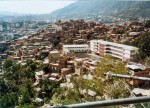
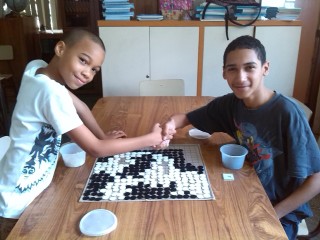
Aim of the Project
The aim of the project is, by using the moral values and rules of living in the game, to help the children improve their self-esteem and tolerance for others with different ideas to their own, improve their thinking and reflecting abilities, improve their capability to establish and obey group norms, and finally increase their school performance. The location where the children live is an extremely dangerous district. These children were forced to become adults too quickly. Our specific target group, therefore, is the 4th grade (children between 10 and 12 years old, an age just before they become teenagers). The project starts at 4th grade in elementary school and continues for three years until 6th grade. After 6th grade, the students have to change to other schools (Fe y Alegria secundary schools; public or private schools). Like this, Go naturally spreads to other places across the city and country, slowly but continuously. The project organisers cannot keep track of all these children, but the Venezuelan Go Association stays in touch and invites them to participate in tournaments.
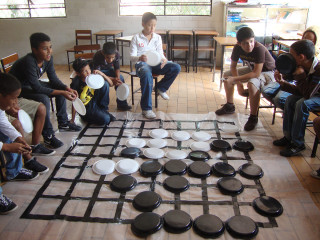
Means of the Project
At the start of the project, there weren't any means: no go boards and go stones, just the library salon as a place to meet.
Volunteers of the Venezuelan Go Association (AVG) provided go equipment. Especially for the project, the AVG made a big magnetic go board. In the meantime, the children themselves made go boards from paper and go stones from caps of soft drinks. In 2009, The AVG got a set of go stones donated by the Thai Go Association. These stones were brought to Venezuela by a volunteer group, The Go International Exchange Society, which kindly loaded up the heavy material from Japan (the stones traveled from Thailand to Japan and finally to Venezuela). These twelve sets allowed the AVG to expand the Gakko No Go Project to four schools: Maria Inmaculada, Kennedy, Aguirre and Bonet (school for the deaf-mute). We have no go books, we use the teaching method written by Mr. Fernando Aguilar. Go stones are very difficult to come by and very expensive. A lady of the AVG is making go boards from denim. The children live in a poor area without many facilities, for most of them the Internet is only available in Jesus Maestro school.
Geographic Extension
Petare, a favela neighbourhood in Caracas, Venezuela.
Results
- Every year around thirty new children learn the game of Go. This means 30 families took contact with Go.
- Children participated in tournaments, learned discipline and felt proud of their medals and achievements.
- Children involved in the project developed a better sense of friendship.
- Children developed interest in foreign languages like Japanese and Chinese.
- Children had the opportunity to represent Venezuela in the ORION tournament on the Internet. It was a feature that required a sense of responsibility.
- Children participated in a Tournament of Mind Sports Games, a public demostrations festival, the Japan Cultural Week, the Sports Japanese Festival, amongst other things. Through these events, they got in touch with other cultures.
- Ibero-America now has a written method of teaching go in Spanish which helps instructors and volunteers in the continent.
- Even the children who abandon school because of their hard lives, keep Go in their heart, as a positive memory.
Public Exposure
Facebook page: GAKKO NO GO.
Red Innovemos of UNESCO recognised the project on their webpage: www.redinnovemos.org
Human Resources
- Sister Marisela Mujica (Fe y Alegria): organisation and coordination of all the go activities for classes and tournaments in schools (at least four hours per week since 2008).
- Ms. Maria (Loli) Puerta: organisation and coordination of all the go activities between Fe y Alegraa and Asociacion Venezolana de Go (at least four hours per week since 2008).
- Mr. Fernando Aguilar (a year and a half, including three visits to Venezuela (around 25 days)).
- Mr. Omar Pacheco (2dan): main teacher (at least two hours per week from 2008 to 2012, then five hours per week during 9 months in 2012 and 2013, and three hours per week for 3 months in 2014).
- Mr. Julio Melchert (2dan): teacher (at least five hours per week during 9 months in 2012 and 2013, and three hours per week during 3 months in 2014).
- Mr. Daniel Gutierrez (1dan): volunteer teacher (at least two hours every two weeks from 2011 until now).
- Mr. Angel Gutierrez (3kyu): volunteer teacher (at least two hours every two weeks from 2011 until 2013).
- Mr. Jesus Gpmez (10kyu): volunteer teacher (at least 1 hour per month from 2013 until now).
- Mr. Tomas Rosario, Mr. Irwin Henandez, Mr. Aghner Florez, Mr. Jose Parra, Mr. Gerardo Useche, Mrs. Agnes Metanomsky, Mr. Fernando Febres, Mr. Ramon Nunez, Mr. Abel Perez (at least 30 hours per person).
- Sisters and staff of the Jesus Maestro School and one coordinator in every school.
- Other go players assistants tournament from 2008 until now.
Financial Resources
Since 2013 we have no financial resources due to the very difficult economic situation in Venezuela.
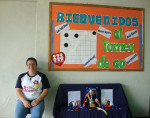
Perspective
For the 2015-2016 schoolyear we have a challenge: to keep the project active!
During the project we detected something else to do: to give lectures to the parents and teachers in the schools. Our new challenge is to involve them for better support of the children.
Wishes
The Gakko no Go Project needs a way to pay teachers who can provide Go classes formally (inside the school program). Volunteer time (Saturdays) is not adequate to sustain and develop the program. One hour of class per week / per school / per teacher costs 10 US$ (transportation to school takes two hours). This comes down to US$400 per year / per school. We would appreciate it very much if somebody can collaborate with us.
Also, if somebody can donate: go stones, things for prizes (like books, go t-shirts, etc), this would help a lot.
Additonal Comments
Thanks a lot for inviting us to participe!
